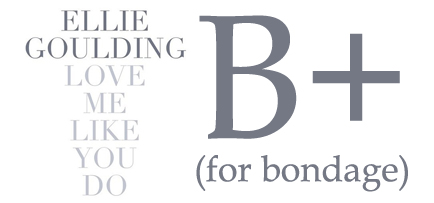I’ve already reviewed one of the songs from the Fifty Shades of Grey soundtrack; better go for the other one currently in the charts. Here’s a little recap of the story so far: I do not like Fifty Shades of Grey because it romanticises a relationship which is abusive, and because Christian Grey himself is a manipulative, sadistic, near-rapist arsehole. I do like Love Me Like You Do though because it at least seems aware of it’s source material’s more problematic elements and does try to negate them.
I’m not sure that same can be said about Earned It.
Before I start critiquing the lyrics though, let’s point out the good bit of the song: the music. With it’s strings and classical underpinnings, it actually sounds very lavish, understated and refined. The music is played with a lot of strength though; it’s very confidentially played with each individual note sounding like it’s been purposely placed where it is for maximum effect. In short, it sounds like I assume Christian Gray is supposed to: rich and classy with an undertone of power. It’s very Fifty Shades of Grey.
And I suppose the lyrics are too, though that is not a compliment. I’m assuming the phrase “Girl you earned it” was written to tie into the BDSM sentiment of “Yeah, you’re a bad girl, I’m going to make you earn your pleasure”, etc, etc; the girl in question having “earned” the narrator’s loving and sexiness by “work[ing] it” and being so “perfect” that the narrator has no choice but to be in love with them.
This’s all fair and good but let’s apply this to the narrative of Fifty Shades, shall we? At the start of the the first book, Anatasia Steel is stalked and threatened by Christopher Gray multiple times, being told at one point that Gray will not take no for an answer from her and will just straight up kidnap her if she refuses to go out with him enough times. Christian Gray saw Anatasia, perceiving her as “work[ing] it” and being “perfect”, and thus decided that he was going to have her. In order to get her, he resorted to intimidation and psychological bullying. The books gets away with it (vaguely) because Anatasia is actually quite into Christopher Gray and thus does say “Yes” to him eventually, but just imagine if Christian Gray saw someone who didn’t want to say “Yes” to him at all and refused to go out with him. See how quickly that story would become the tale of a violent, sociopathic rapist preying on a poor woman who doesn’t deserve it.
Considering how close to rapey Fifty Shades of Grey thus gets at the best of times, some of the word choices in “Earned It”‘s chorus become almost staggering stupid. In particular, the line “Girl, you deserve it”: Girl, you look sexy and I have decided to love you and thus I am now allowed to do whatever I want to you because you’re hot. More than that, you deserve all of what you get, purely because you are attractive. Put another way: She was asking for it officer; if she didn’t want anything to happen, she wouldn’t have wore that dress.
Now maybe this is a tad unfair and over-exaggerated a reading. Taken away from the Fifty Shades context, this song is about two people who have been burnt by love, yet are still attracted to each other. “I’m so used to being used / So I love when you call unexpected […] On that lonely night / You said it wouldn’t be love / But we felt the rush / It made us believe it there was only us.” The narrator loves his girlfriend and had seen her be hurt before and knows what that hurt is like, so he swears to protect her and makes sure she never feels that hurt again. It’s a solid enough sentiment to me.
When put back into context though, the words that this sentiment are delivered through become really unfortunate and crude. They fight against and in many ways negate what the song’s actually about; they’re not well chosen at all. Frankly, if you’re writing a song that’s about Fifty Shades of Grey, you don’t put the line “You deserve it” in the chorus. That’s genuinely enough to destroy the song for me alone.
It also doesn’t help that I just don’t like The Weeknd’s voice on this track: in the verses, he’s tries too hard to sound like Ne-Yo and ends up becoming whiny. He does sound better once he goes into falsetto but he’s never as smooth and refined as the rest of the track is (or, for that matter, as smooth and refined as Christian Gray supposedly is): his singing just doesn’t work.
Conclusion: Much like Love Me Like You Do, Earned It is a solid love song ruined by being associated with Fifty Shades. Love Me Like You Do had enough good elements to counteract the Fifty Shade influence though; Earned It doesn’t. It’s a not very good song for a not very good film of a not very good book. The best thing I can say about it: it at least fits its source materials.












